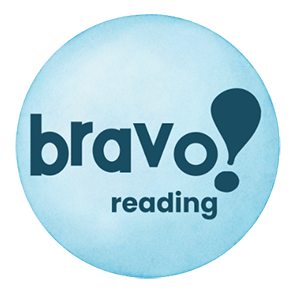Make Sounding Out Words Easy!
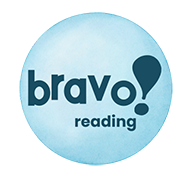
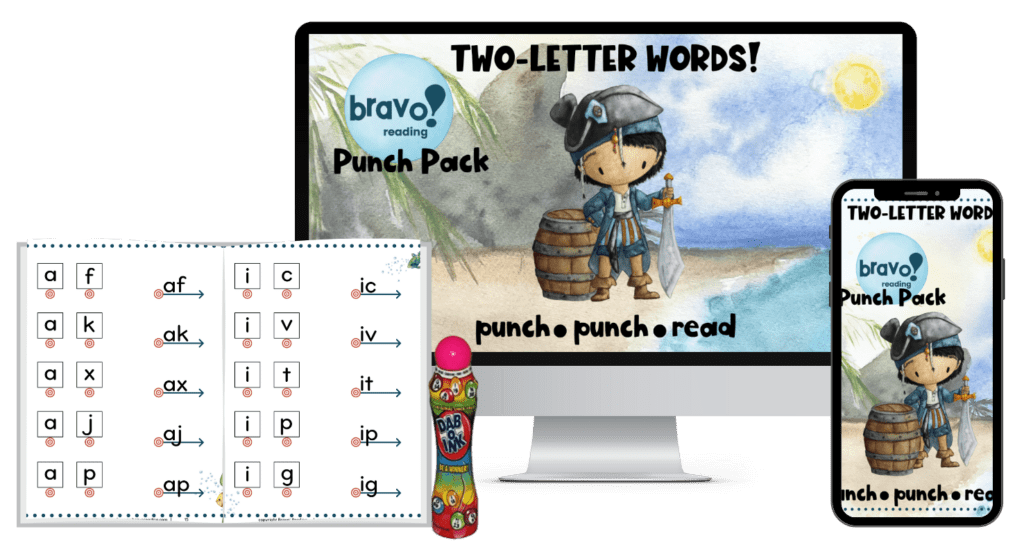
Sounding out words.
Simple, right?
Nope.
Not if you have dyslexia.
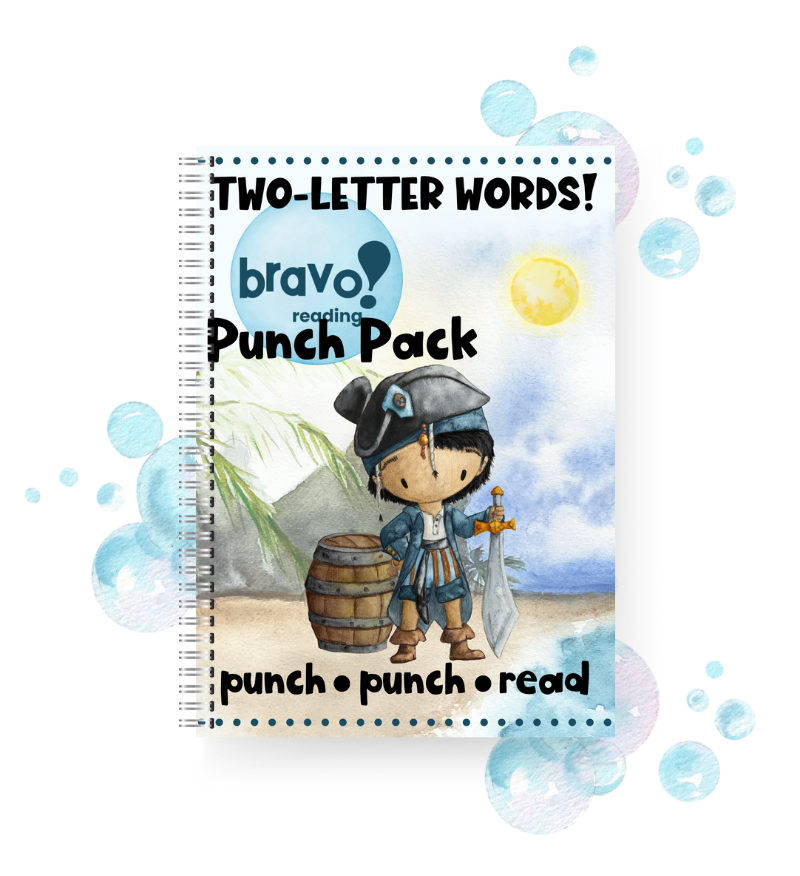
If your child has dyslexia, sounding out words is a nightmare!
It creates tons of stress and anxiety just thinking about sounding out words. And, why shouldn’t it?
Words wriggle and bounce. Letters are shaking and moving and backward. One second the letter is a “b”, the next second, it’s a “d”.
People tell your child to try harder. That enough effort isn’t being put forth.
But that’s usually the furthest thing from the truth. Kids with dyslexia usually work harder than other kids. That’s because reading is difficult for them.
Reading is hard for them because kids with dyslexia lear differently than other children. That doesn’t mean they aren’t smart. They’re plenty smart. It’s just that sounding out words is hard for them. They don’t learn in the bit-by-bit thinking way that you need to decode words with ease.
For kids with dyslexia, sounding out words is about like climbing Mount Everest! The process is foreign to kids with dyslexia, and problems with reading fluency and comprehension crop up because of this.

Decoding is the ability to translate a coded message into intelligible language. This simply means sounding out words.
It’s hard for kids with dyslexia to decode or sound out words because they learn differently than other children.
This doesn’t mean they aren’t smart! By definition, kids with dyslexia have average or above average intelligence.
It’s just a difficult skill because they need another route to reading and decoding success!
The Ways Of Tradition And How They Don’t Work Anymore
Kids with dyslexia need a different way to learn; that’s all. They need a decoding system that is based on movement taught in a multi-sensory way.

Movement is important because children with dyslexia are usually hands-on or tactile learners. They learn best by doing, not by seeing or hearing.
When these kids use their bodies to learn, then sounding out words isn’t hard. When asked to learn by seeing or hearing, they fall apart, often just zoning out because they don’t know what else to do.
In addition, kids with dyslexia also need a multi-sensory approach to sounding out words, because they have weakened visual and auditory processing systems. A multi-sensory approach uses visual, auditory, and kinesthetic activities to teach something. Of course, there’s more that takes place when teaching kids to decode words, but these two exercises help your child more than any others!
How Small Units Of Sound Help In Many Different Ways
Research tells us that if your child struggles when sounding out words, then a phonemic awareness-based reading program works best. Phonemic awareness is the ability to to recognize and manipulate the spoken parts of words. This includes syllables, beginning letters, and phonemes.

Phonemes are the small units of sound that our language is made up of. Examples of phonemes are “ip”, “ex”, “am”, “ot”, and “ug”. There are forty-four phonemes in our language. When your child has a strong working knowledge of these phonemes, then decoding or sounding out words is much easier.
If your child has dyslexia, using phonemes is one of the surest routes to reading and academic success. In order to sound out words, your child must have a firm grasp of those forty-four phonemes. In addition, your child must be able to add chunks of other syllables and phonemic units to them to form multi-syllable words.
Research tells us that kids with dyslexia learn these phonemic units best when taught in a multi-sensory fashion. Orton-Gillingham methods also work well for helping kids with dyslexia decode words. When the Orton-Gillingham approach is used (with innovative techniques included), sounding out words becomes a breeze!

Fill out the form below to get you free copy of the Bravo! Punch Pack.

Listening to a child with dyslexia read out loud can make your cringe. That’s because sounding out words is difficult. Consequently, these weak decoding skills cause poor fluency scores. But the true cause of poor fluency and decoding skills in kids with dyslexia is because traditional reading programs have failed to meet their unique needs.

Traditional programs don’t address how a child with dyslexia learns. They fail to speak your child’s “learning language”. In addition, a child with dyslexia learns to decode words through movement. Because of this, a multi-sensory approach to sounding out words is also needed.
Unfortunately, traditional reading programs rely on phonics, matching, flash cards, and “drill and kill” methods.
This is like speaking a foreign language to a child with dyslexia.
The Right Side Of The Brain: Sounding Out Words
Did you know that most kids with dyslexia are usually right-brain dominant? This means they are creative. They learn through movement, color, pictures, music, and rhythm. But sounding out words trips them up almost every time!

Traditional reading programs still focus largely on phonics, yet phonics is a left-brain dominant activity.
Phonics worksheets force your child to circle pictures that match sounds. This doesn’t resonate with kids who have dyslexia. Remember, if your child has dyslexia, movement is king. Over and over again, when kids with dyslexia are spoon fed traditional activities, they are set up
Most people think it’s easy sounding out three-letter words. But if your child has dyslexia, a simple three-letter word often causes panic to set it. Decoding multi syllabic words can take these kids over the edge!
When two-letter word decoding is weak or missing, then it’s absolutely daunting. Traditional programs usually force young, emergent, or dyslexic readers into decoding these three-letter consonant/vowel/consonant words way too soon.
This causes a lot of damage!
The Place To Start – Sounding Out Two-Letter Words
By making sure your child masters sounding out two-letter words before moving to decoding three-letter words, a strong decoding foundation is built.

Fear and panic aren’t part of your child’s reading equation because reading strategies remain strong. Your child knows exactly what to do when coming across a new or unfamiliar word.
An example of a consonant/vowel/consonant word would be “sat”. The first letter is a consonant, the second a vowel, and the third is a consonant.
All too often, kids with dyslexia are forced to sound out these three-letter words when they don’t even know letter sounds, especially vowel sounds, which often trip them up. Instead of spending more time on foundational decoding skills taught in a way they can understand, kids with dyslexia are often bumped into higher-level material before they are ready. Skills mastery is never achieved, and the chain of reading failure begins.
Once again, the dyslexic reader is left standing in the cold without a coat!
The Sensory Component of Sounding Out Words
Kids with dyslexia are usually weak in auditory and visual processing skills. This means that learning through traditional methods (visual and auditory) will be difficult. That’s why most kids with dyslexia are hands-on learners. Their other senses simply aren’t as strong, so they rely on “doing” something to learn. Being a tactile learner is perfectly acceptable! The only problem is when your child’s reading program fails to take this into consideration!
If your child has dyslexia, then movement is important for learning. This means that your child’s decoding program needs to teach through movement.

And not every kind of movement works. Kids with dyslexia need large motor movement to truly set in skills. Moving a tile or circling a phonics picture isn’t enough movement for these kids!
Large motor movements are what connect the dots for these kids!
When kids struggle with sounding out words, then visual and auditory memory skills are most likely weak. All too often, kids with dyslexia are only able to recall two or three shapes in visual memory. This means that they fatigue after decoding a two or three letter word. You see, each letter is a symbol or an image, so if they can only recall two or three shapes, then it’s going to be extremely difficult to sound out multi-syllable words.
When being forced to sound out three-letter words too soon, confusion and frustration mount. Your child starts to fear reading, avoiding it at all costs.
A Pivotal Skill: Sounding Out Words
Traditional reading programs don’t spend enough time allowing children to practice sounding out words having two letters before moving on to three letters. This damages the dyslexic child. The dyslexic reader is already weak in visual and auditory processing, so this makes the process more difficult than it needs to be! Kids with dyslexia need a lot of practice sounding out words with two letters before moving on to three-letter words.
Most likely, this is because we don’t have a lot of two-letter words that follow phonetic spelling and reading rules.
But Bravo! Reading solved this problem by that issue using nonsense words.
How Nonsense Words Make Reading Easier
Nonsense words are beneficial to kids with dyslexia in many ways. First, nonsense words don’t allow your child to guess at words.
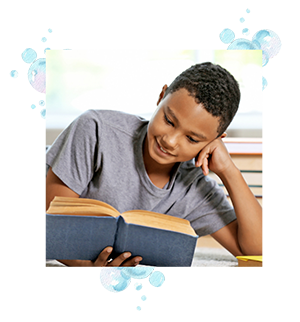
They must sound out words using decoding rules and strategies. Because there is nothing familiar about the nonsense words other than the sounds of letters, kids must slow down and decode nonsense words!
Next, children with dyslexia are meaning-driven. They use meaning to survive a world that isn’t always stable for them. Sensory input is skewed, so they rely on meanings to carry them through long days at school.
Because these kids love meaning, they will often memorize words. This leads to a lack of strategies when attempting to decode words they don’t know.
Nonsense words are also beneficial for kids with dyslexia because they use pictures in their minds for words instead of decoding or sounding out the words. Although making pictures in the mind is a useful skill, when kids rely on this as a strategy for decoding, it doesn’t work. All too often, these kids bring up the wrong picture for a word they are trying to sound out. This leads to poor reading comprehension because the meaning was changed.
Two-letter nonsense words are extremely useful in helping kids with dyslexia build a strong decoding foundation!
So, What is Decoding, Anyway?
Do you ever get confused about what decoding actually is? The dictionary definition of decoding is: a way to convert something, such as a code, into intelligible form or to recognize and interpret a signal.

Although this sounds like a lot, decoding simply means sounding out words while reading.
Decoding is the backbone of reading. If your child struggles to decode, then your child is missing strategies to sound out new or unfamiliar words. This leads to bad reading habits, poor fluency skills, and weakened comprehension scores.
There are certain rules needed to read, and most kids learn them without much fuss. They make typical progress and can decode when necessary. Automaticity sets in and they don’t fear reading or panic when coming across new words.
Sounding Out Words Feels Like a Foreign Language to Kids with Dyslexia!
If your child has dyslexia, then sounding out words feels like speaking a foreign language. It doesn’t make sense to your child’s line of thinking and processing of information.

That’s because the rules for decoding are lost on kids with dyslexia. They don’t naturally think in a way that lends itself to sounding out words.
But kids with dyslexia thrive when they’re shown decoding skills in a way they can understand. The way that worked for your parents won’t work for these kids. Neither will traditional reading programs like those used in schools. Flashcards, phonics worksheets, and “drill and kill” activities won’t work for kids with dyslexia. Nor will left-brain dominant reading activities.
These are all activities used in traditional reading programs, which work for most kids. Schools cater to the masses, but children with dyslexia are not part of this group. They are part of twenty percent of the population that learns differently. That means, simply put, that they need a different route to sounding out words.
With movement, color, brain-based learning, phonemic awareness, and a multi-sensory, Orton-Gillingham based approach, your child can learn to sound out words with ease.
The Bravo! Punch Pack Helps Your Child Sound out Words!
The Bravo! Punch Pack will give your child a beginning set of tools to decode words using large motor movement in a multi-sensory way. It is teacher-recommended and a totally FREE resource to help your child learn to sound out two-letter words.
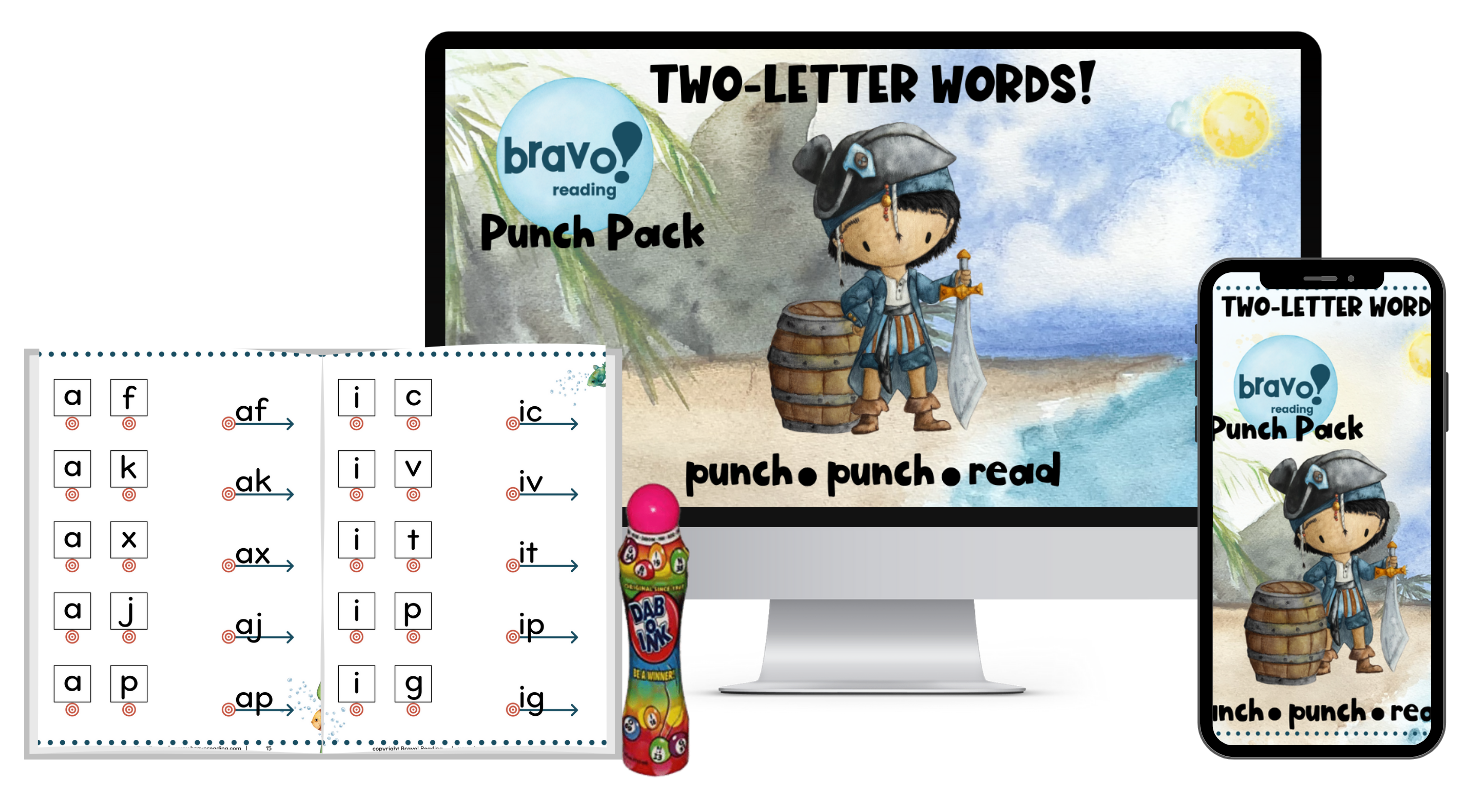
The first step of decoding is to know letter sounds, including vowel sounds, with automaticity. Once your child can do this, it’s crucially important that two-letter words are mastered. Due to weak visual and auditory memory skills, it’s important that kids with dyslexia aren’t forced to read three-letter words too soon.
The Bravo! Punch Pack and Level 1 of the Bravo! Reading Program take care of that in short order! As a matter of fact, The Bravo! Punch Pack is an excerpt from the longer and more thorough Level 1 of the Bravo! Reading Program.
Your child needs a strong decoding method of sounding out words with comfort and ease. This starts with sounding out two-letter words.
And the Bravo! Punch Pack gives your child that set of tools!
How the Bravo! Punch Pack Works
With the Punch Pack, kids punch a target beneath letter tiles with dot dabbers or bingo markers. This is a fun and perfect way to use large motor movements for sounding out words.

Kids, especially those with dyslexia, think it’s a blast to learn two-letter words with such engaged movement.
Your child will love sounding out words by pounding on Bravo! Bullseyes! Bravo! Bullseyes are red targets beneath each letter tile. Your child uses a dot dabber to punch each Bravo! Bullseye while saying the sound of the letter out loud at the same time. When both letters of the word are punched, your child moves to the Bravo! Bolt at the left side of the page.
So far, your child has been using the Bravo! Reading chunking process that breaks words down into smaller chunks and adds in movement to set in long-term learning. Now your child slides the dot dabber across the Bravo! Bolt while at the same time blending the two letters of the word together.
Brain-Based Learning for Sounding out Words!
The activities in the Bravo! Punch Pack are excellent examples of brain-based learning. As a result, the body and brain work together to build new neural pathways in the brain. This wires together the sound and seeing portion of decoding while your child moves and speaks letter sounds, finally blending letters together to form a word.

This is the missing step that traditional reading programs and most reading programs aimed at dyslexia leave out!
Most of the words in the Bravo! Punch Pack are nonsense or made up words. This is because there aren’t that many two-letter words in our language. But there’s another reason for it. Right off the bat, we want kids to learn to decode correctly. Using nonsense words gets rid of bad habits before they start!
Kids with dyslexia get caught up in the meaning of words. They do this for many different reasons, but mostly because their worlds are often “topsy-turvey” because they perceive the world differently than others. Meaning sticks for them. Meaning makes sense.
As mentioned previously, because of their love of meaning, kids with dyslexia make mistakes while sounding out words. They want the meaning of the word, they want to get to the end point of letting it roll off their tongues with ease, and they don’t want to wait for it. They don’t want to decode or sound out the word letter by letter with automaticity when that tantalizing meaning is right around the corner.

Just fill out the form below to download the Bravo! Punch Pack!

Automaticity Means it Happens without Thinking About It
Remember…automaticity is hard for kids with dyslexia. Meaning is what carries them. This rush to get finished usually causes them to guess at words, and usually the guess is wrong.

But by using nonsense words with movement, color, and a multi-sensory approach, your child masters decoding two-letter words with ease.
With nonsense words, your child can’t search for meaning in a word, because there is no meaning. There’s no other choice than to decode the word letter by letter.
Once sounding out two-letter words is mastered, your child is able to move on to decoding three-letter words!
Here’s the best news of all! The Bravo! Punch Pack is chock full of two-letter nonsense words for your child to sound out in a fun way – with a dot dabber or bingo marker!
A Sample Page from the Bravo! Punch Pack
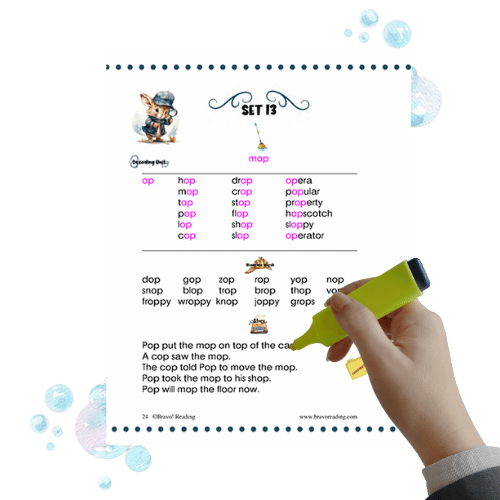
Kids Have Fun While Sounding out Words!
Kids with dyslexia revel in movement, and punching letters with dot dabbers to decode is right up their alley. Because of this, kids with dyslexia or those struggling to decode rarely realize that they’re reading.

Sometimes, they even argue with you that they aren’t reading. They’re dot dabbing!
Here’s the great news. When reading and decoding exercises are easy and fun, then kids want to stay with it. And everyone knows that practice makes perfect, as long as it’s the right kind of practice!
When your child decodes the Bravo! way, it’s easy peasy! Even better, once your child can easily blend two letters together, then decoding confidence set in. Your child won’t be afraid to attempt sounding out three-letter words. Even better, multi-sensory words and difficult variants can be tackled instead of avoided.
These are natural decoding jumps and logical ways to teach decoding skills, especially to children with dyslexia.


Get More Tons of Reading Value in a Package Deal!

When you order The Bravo! Bundle you’ll get the tools you need to help your child overcome reading challenges and save tons of money along the way! The Bravo! Bundle will make difference between stumbling over words and reading with confidence.
The Bravo! Bundle includes the eleven levels of the Bravo! Reading Program, the Bravo! Beginner, and all of Bravo! Reading’s expansion packs. The expansion packs include the Bravo! Booster Pack, the Bravo! Super Booster Pack, and the Bravo! Decoder Pack.



To get the FREE Bravo! Punch Pack, just fill out the form below, and it will be immediately delivered to your email address!


